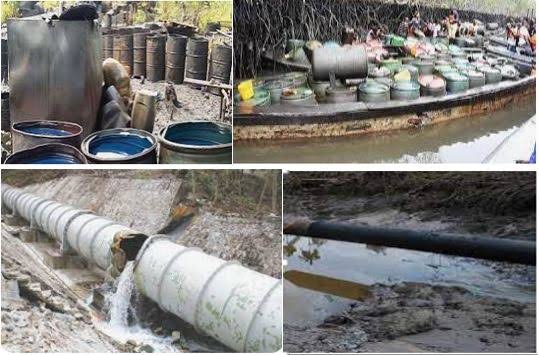Over the past 23 years, Nigeria has lost an estimated $25.7 billion (₦39.3 trillion) to crude oil theft, a crisis deeply rooted in elite complicity and systemic failure. This staggering loss, equivalent to 353 million barrels of oil, has significantly undermined government revenue, increased public debt now at ₦149.4 trillion, and intensified poverty nationwide.

According to the Nigerian Upstream Petroleum Regulatory Commission (NUPRC), the volume of stolen crude equals roughly 56.1 billion litres—enough to fill 1.2 million fuel tankers of 45,000 litres each. At a current average price of $73 per barrel, the financial impact represents nearly 72% of Nigeria’s 2025 national budget.
A Two-Decade Crisis of Organised Oil Theft
Oil theft in Nigeria escalated in 2002, with losses averaging 11,800 barrels per day (bpd), totaling 4.3 million barrels that year. The problem intensified in subsequent years, peaking at an unprecedented 102,900 bpd in 2021, resulting in the loss of 37.6 million barrels.
Although there was some reprieve in 2023 and 2024, with average daily losses reducing to around 11,300 bpd, theft remains a serious challenge. As of May 2025, average daily losses stood at 11,100 bpd—translating to 1.67 million barrels already lost this year.
Militancy in the Niger Delta, weak enforcement, and the ability of elite-backed criminals to access sophisticated vessels and tap into pipelines undetected have contributed to the crisis. The Nigerian National Petroleum Company Limited (NNPCL) reportedly spent ₦267.98 billion between 2022 and 2023 on security for oil infrastructure—averaging ₦16 billion monthly.
Infrastructure Breakdown and the Shift to Barging
Due to frequent sabotage of key export pipelines like the Nembe Creek Trunk Line (NCTL), many oil producers have abandoned pipelines in favour of barging—an expensive and less efficient alternative. Companies such as Green Energy International Ltd and Nembe Exploration and Production Company Ltd have developed new export terminals or turned to barging to mitigate losses, some of which previously reached 90%.
Green Energy recently commissioned a 350,000 bpd capacity terminal in Port Harcourt, potentially enabling the return of 40 indigenous producers who had abandoned their fields. Nembe E&P’s Managing Director, Victor Okoronkwo, disclosed that a new terminal in development could increase production to 120,000 bpd.
Despite these adaptations, Nigeria’s crude output still lags far behind the 2.06 million bpd benchmark in the national budget. Current production hovers at about 1.4 million bpd, straining both revenue and foreign exchange reserves.
Spike in Oil Rig Activity and Upstream Investment
Amid security challenges, there are signs of revitalization in Nigeria’s upstream sector. The number of active oil rigs rose from 10 in 2020 to a record 44 by July 2025. The country is also experiencing a surge in well development, partly driven by the implementation of the Petroleum Industry Act (PIA).
2022: 38 wells completed; $1.98 billion invested
2023: 76 wells completed; $1.53 billion invested
2024: 120 wells completed (a four-year high); $2.71 billion invested
2025 (so far): 72 wells projected; $1.96 billion investment

Over four years, Nigeria attracted about $8.18 billion in capital for drilling and completed 246 wells. Re-entry and intervention operations also saw massive growth—from 92 in 2022 to 436 in 2023—accompanied by a capital surge from $84 million to $788 million. Cumulatively, well development in this period accounted for nearly $10.05 billion.
The Cost of Insecurity and Policy Lapses
Industry experts argue that high operational costs—exceeding $40 per barrel—and persistent sabotage are eroding Nigeria’s competitiveness. Dr. Diran Fawibe, CEO of International Energy Services Ltd, blamed the entrenched nature of oil theft on the government’s historical failure to act decisively.
He called for the establishment of a judicial commission of inquiry, urging oil companies, regulators, and security agencies to testify under oath. Fawibe also criticised the lack of transparency in monitoring crude exports via barging and trucking, warning that it further weakens revenue integrity.
Economist Prof. Adeola Adenikinju, President of the Nigerian Economic Society, noted that investor confidence is dampened by operational uncertainties and rising costs. While barging may offer short-term relief, he stressed that pipelines remain the most efficient mode of crude transport and that their abandonment signals governance breakdown.
Similarly, Professor Segun Ajibola, former President of the Chartered Institute of Bankers of Nigeria, condemned the trend of neglecting pipeline infrastructure, describing it as a costly deviation triggered by insecurity. He called for stronger security frameworks, periodic reviews of surveillance contracts, and development efforts to address the root causes of unrest in the Niger Delta.

Energy analyst Henry Adigun added that, given current insecurity, operators naturally gravitate toward more controllable options like barging—even if more expensive. He warned that unless the government secures existing infrastructure or builds new pipeline networks, operators will continue making risk-based decisions at the expense of long-term national interests.
The Way Forward
While recent gains—such as increased rig activity, new terminals, and revived investment—signal progress, stakeholders agree that Nigeria must urgently overhaul its approach to oil security. Without transparent oversight, stricter penalties, and sustained investment in infrastructure, the vicious cycle of crude theft and economic sabotage is likely to persist, undermining any future growth in the sector.




